Hospitality Provision: Travel and Tourism Sector Report Analysis
VerifiedAdded on 2020/12/18
|14
|4941
|353
Report
AI Summary
This report examines hospitality provisions within the travel and tourism sector, focusing on the interrelationship between the hospitality and travel industries, using Thomas Cook Group Plc as a case study. It explores the scope and scale of the hospitality industry, the impacts of integration through horizontal and vertical strategies, and how these strategies affect hospitality businesses. The report also includes a plan for a hospitality business, encompassing operational requirements and strategic considerations. The analysis covers various aspects, including the role of hospitality in tourism, the benefits and consequences of integration, and the development of a rationale for a selected project, providing a comprehensive overview of the sector's dynamics and strategic approaches.
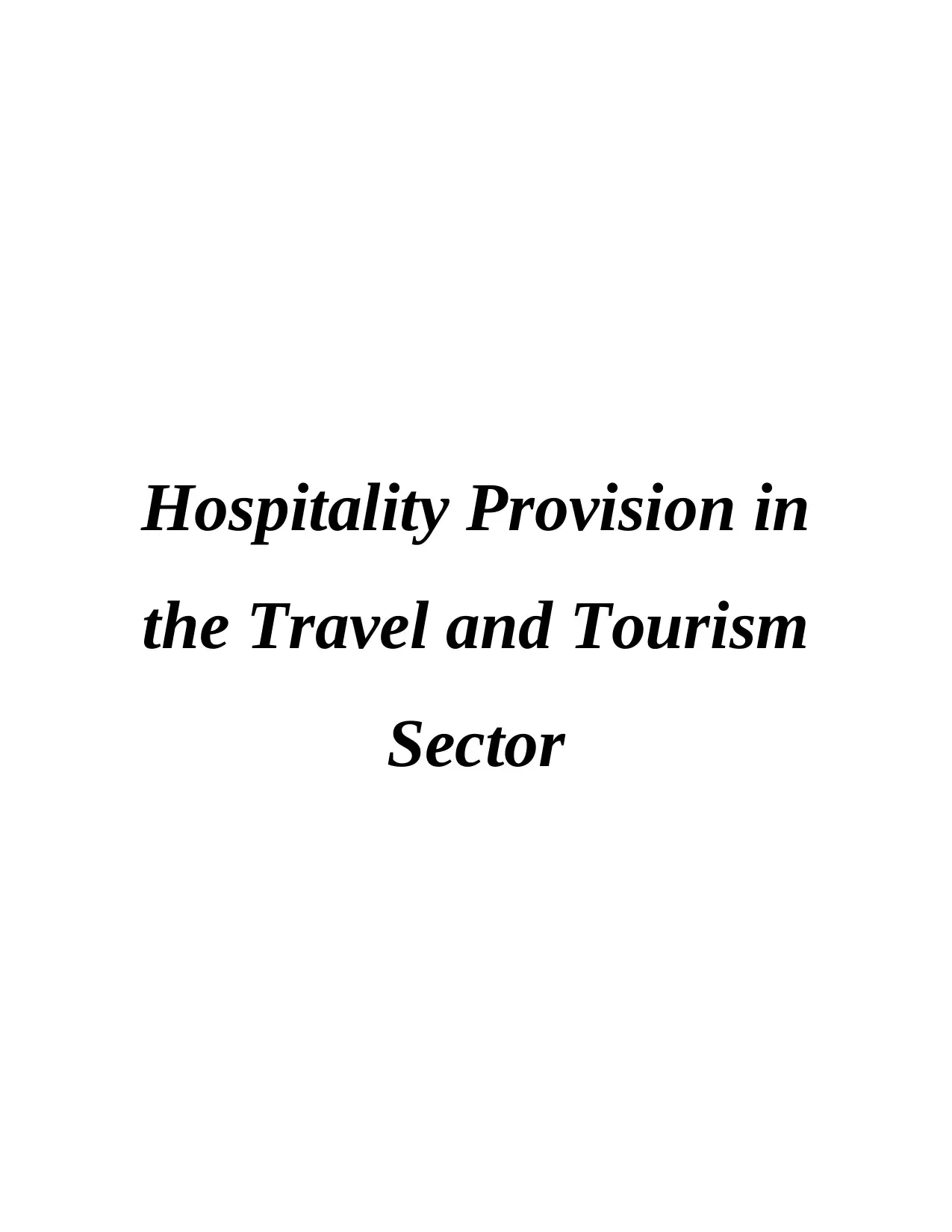
Hospitality Provision in
the Travel and Tourism
Sector
the Travel and Tourism
Sector
Paraphrase This Document
Need a fresh take? Get an instant paraphrase of this document with our AI Paraphraser
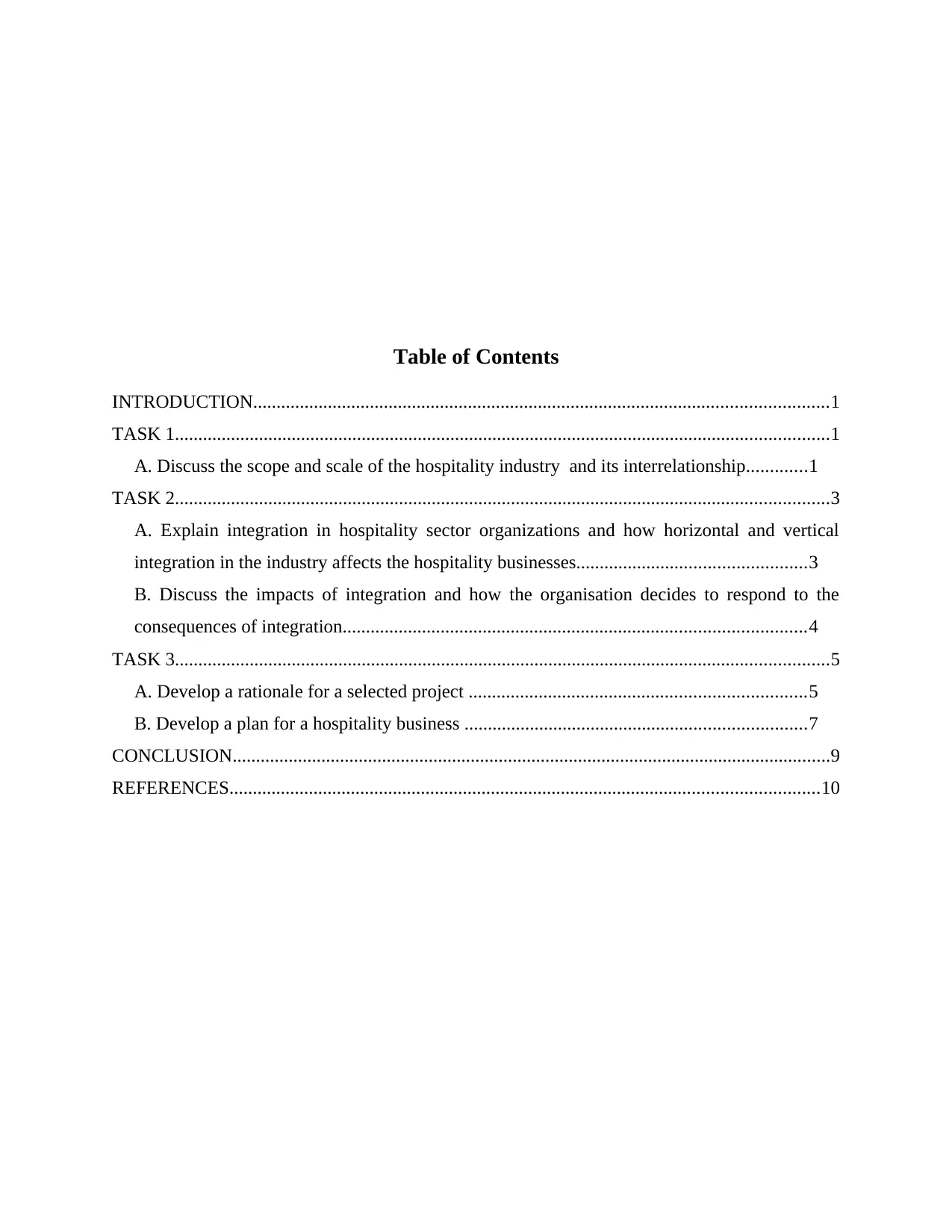
Table of Contents
INTRODUCTION...........................................................................................................................1
TASK 1............................................................................................................................................1
A. Discuss the scope and scale of the hospitality industry and its interrelationship.............1
TASK 2............................................................................................................................................3
A. Explain integration in hospitality sector organizations and how horizontal and vertical
integration in the industry affects the hospitality businesses.................................................3
B. Discuss the impacts of integration and how the organisation decides to respond to the
consequences of integration...................................................................................................4
TASK 3............................................................................................................................................5
A. Develop a rationale for a selected project ........................................................................5
B. Develop a plan for a hospitality business .........................................................................7
CONCLUSION................................................................................................................................9
REFERENCES..............................................................................................................................10
INTRODUCTION...........................................................................................................................1
TASK 1............................................................................................................................................1
A. Discuss the scope and scale of the hospitality industry and its interrelationship.............1
TASK 2............................................................................................................................................3
A. Explain integration in hospitality sector organizations and how horizontal and vertical
integration in the industry affects the hospitality businesses.................................................3
B. Discuss the impacts of integration and how the organisation decides to respond to the
consequences of integration...................................................................................................4
TASK 3............................................................................................................................................5
A. Develop a rationale for a selected project ........................................................................5
B. Develop a plan for a hospitality business .........................................................................7
CONCLUSION................................................................................................................................9
REFERENCES..............................................................................................................................10
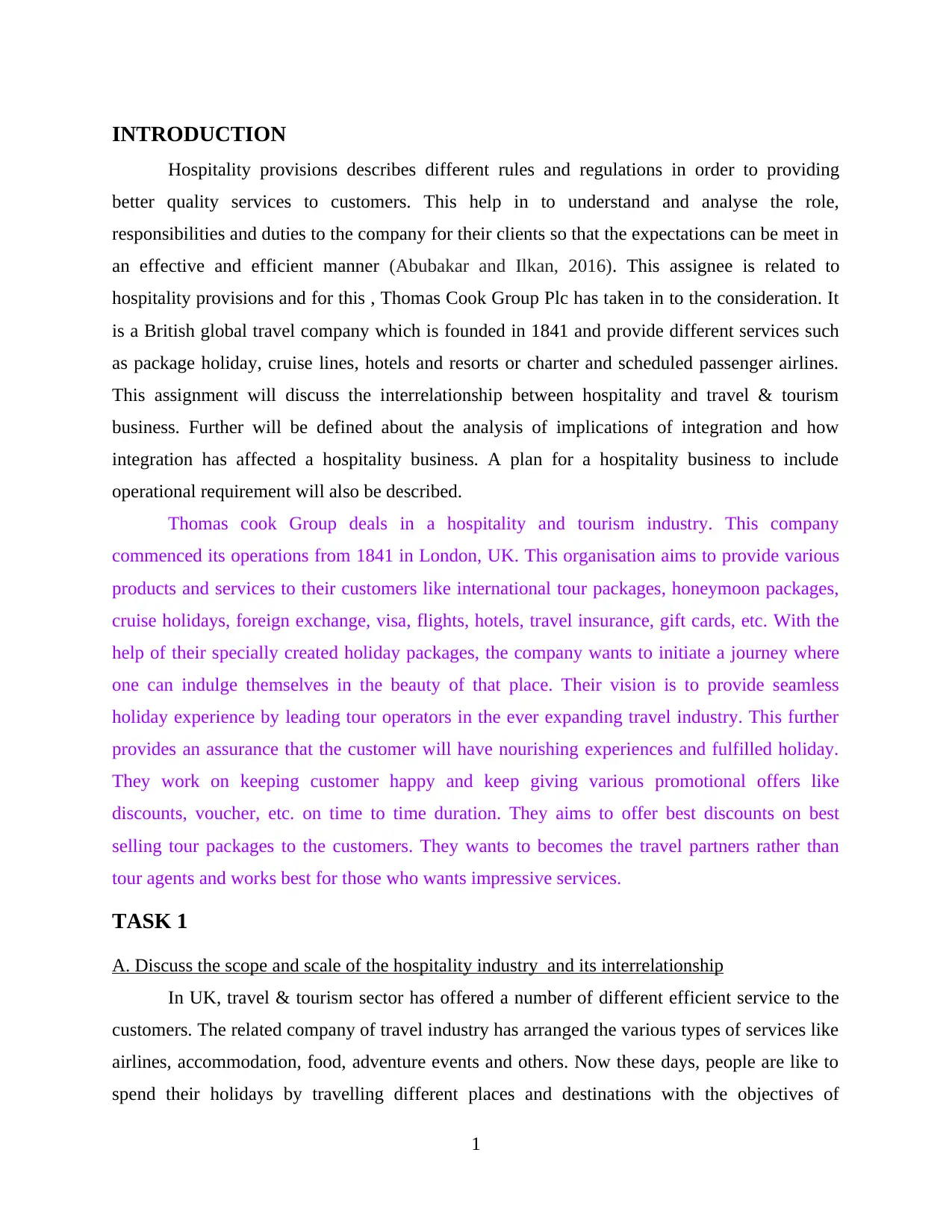
INTRODUCTION
Hospitality provisions describes different rules and regulations in order to providing
better quality services to customers. This help in to understand and analyse the role,
responsibilities and duties to the company for their clients so that the expectations can be meet in
an effective and efficient manner (Abubakar and Ilkan, 2016). This assignee is related to
hospitality provisions and for this , Thomas Cook Group Plc has taken in to the consideration. It
is a British global travel company which is founded in 1841 and provide different services such
as package holiday, cruise lines, hotels and resorts or charter and scheduled passenger airlines.
This assignment will discuss the interrelationship between hospitality and travel & tourism
business. Further will be defined about the analysis of implications of integration and how
integration has affected a hospitality business. A plan for a hospitality business to include
operational requirement will also be described.
Thomas cook Group deals in a hospitality and tourism industry. This company
commenced its operations from 1841 in London, UK. This organisation aims to provide various
products and services to their customers like international tour packages, honeymoon packages,
cruise holidays, foreign exchange, visa, flights, hotels, travel insurance, gift cards, etc. With the
help of their specially created holiday packages, the company wants to initiate a journey where
one can indulge themselves in the beauty of that place. Their vision is to provide seamless
holiday experience by leading tour operators in the ever expanding travel industry. This further
provides an assurance that the customer will have nourishing experiences and fulfilled holiday.
They work on keeping customer happy and keep giving various promotional offers like
discounts, voucher, etc. on time to time duration. They aims to offer best discounts on best
selling tour packages to the customers. They wants to becomes the travel partners rather than
tour agents and works best for those who wants impressive services.
TASK 1
A. Discuss the scope and scale of the hospitality industry and its interrelationship
In UK, travel & tourism sector has offered a number of different efficient service to the
customers. The related company of travel industry has arranged the various types of services like
airlines, accommodation, food, adventure events and others. Now these days, people are like to
spend their holidays by travelling different places and destinations with the objectives of
1
Hospitality provisions describes different rules and regulations in order to providing
better quality services to customers. This help in to understand and analyse the role,
responsibilities and duties to the company for their clients so that the expectations can be meet in
an effective and efficient manner (Abubakar and Ilkan, 2016). This assignee is related to
hospitality provisions and for this , Thomas Cook Group Plc has taken in to the consideration. It
is a British global travel company which is founded in 1841 and provide different services such
as package holiday, cruise lines, hotels and resorts or charter and scheduled passenger airlines.
This assignment will discuss the interrelationship between hospitality and travel & tourism
business. Further will be defined about the analysis of implications of integration and how
integration has affected a hospitality business. A plan for a hospitality business to include
operational requirement will also be described.
Thomas cook Group deals in a hospitality and tourism industry. This company
commenced its operations from 1841 in London, UK. This organisation aims to provide various
products and services to their customers like international tour packages, honeymoon packages,
cruise holidays, foreign exchange, visa, flights, hotels, travel insurance, gift cards, etc. With the
help of their specially created holiday packages, the company wants to initiate a journey where
one can indulge themselves in the beauty of that place. Their vision is to provide seamless
holiday experience by leading tour operators in the ever expanding travel industry. This further
provides an assurance that the customer will have nourishing experiences and fulfilled holiday.
They work on keeping customer happy and keep giving various promotional offers like
discounts, voucher, etc. on time to time duration. They aims to offer best discounts on best
selling tour packages to the customers. They wants to becomes the travel partners rather than
tour agents and works best for those who wants impressive services.
TASK 1
A. Discuss the scope and scale of the hospitality industry and its interrelationship
In UK, travel & tourism sector has offered a number of different efficient service to the
customers. The related company of travel industry has arranged the various types of services like
airlines, accommodation, food, adventure events and others. Now these days, people are like to
spend their holidays by travelling different places and destinations with the objectives of
1
⊘ This is a preview!⊘
Do you want full access?
Subscribe today to unlock all pages.

Trusted by 1+ million students worldwide
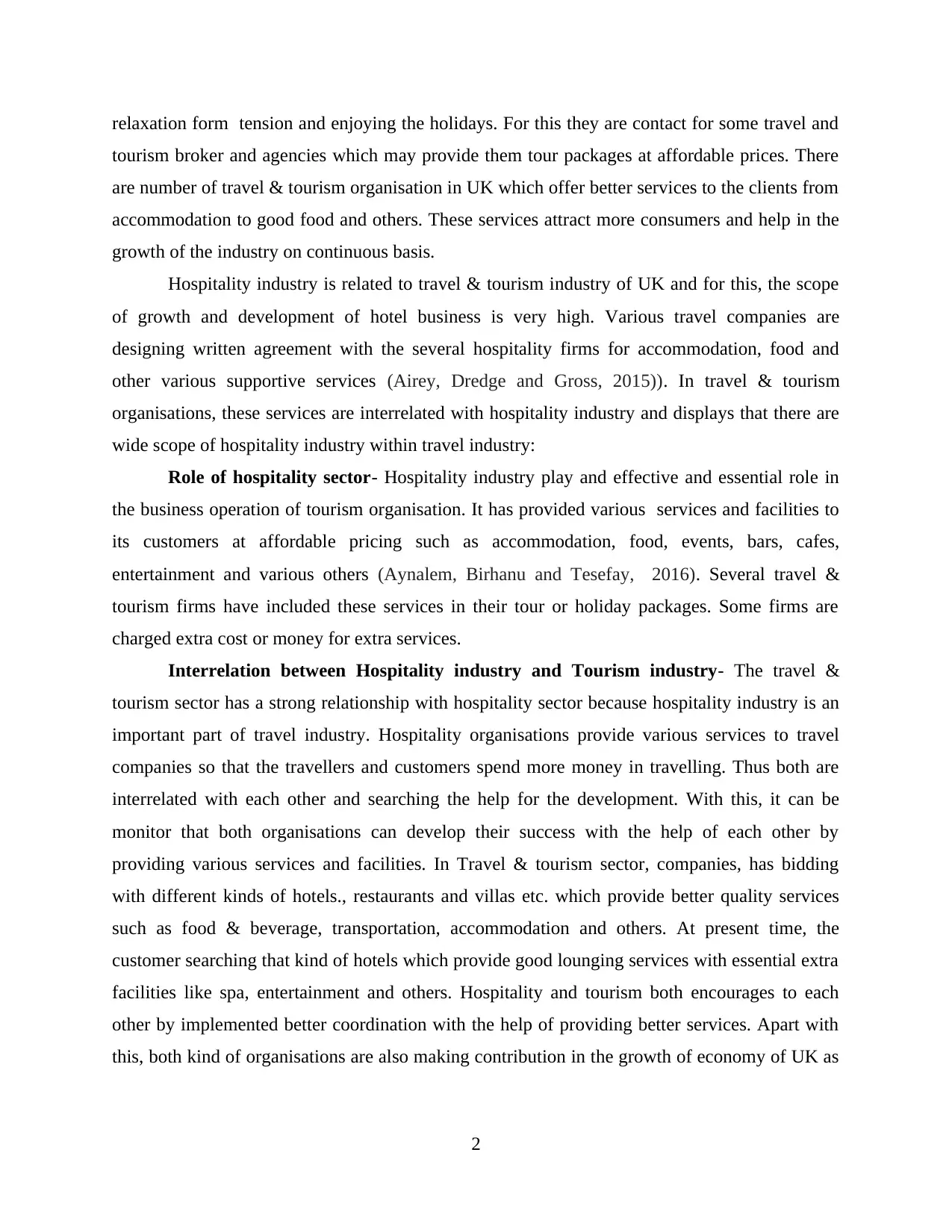
relaxation form tension and enjoying the holidays. For this they are contact for some travel and
tourism broker and agencies which may provide them tour packages at affordable prices. There
are number of travel & tourism organisation in UK which offer better services to the clients from
accommodation to good food and others. These services attract more consumers and help in the
growth of the industry on continuous basis.
Hospitality industry is related to travel & tourism industry of UK and for this, the scope
of growth and development of hotel business is very high. Various travel companies are
designing written agreement with the several hospitality firms for accommodation, food and
other various supportive services (Airey, Dredge and Gross, 2015)). In travel & tourism
organisations, these services are interrelated with hospitality industry and displays that there are
wide scope of hospitality industry within travel industry:
Role of hospitality sector- Hospitality industry play and effective and essential role in
the business operation of tourism organisation. It has provided various services and facilities to
its customers at affordable pricing such as accommodation, food, events, bars, cafes,
entertainment and various others (Aynalem, Birhanu and Tesefay, 2016). Several travel &
tourism firms have included these services in their tour or holiday packages. Some firms are
charged extra cost or money for extra services.
Interrelation between Hospitality industry and Tourism industry- The travel &
tourism sector has a strong relationship with hospitality sector because hospitality industry is an
important part of travel industry. Hospitality organisations provide various services to travel
companies so that the travellers and customers spend more money in travelling. Thus both are
interrelated with each other and searching the help for the development. With this, it can be
monitor that both organisations can develop their success with the help of each other by
providing various services and facilities. In Travel & tourism sector, companies, has bidding
with different kinds of hotels., restaurants and villas etc. which provide better quality services
such as food & beverage, transportation, accommodation and others. At present time, the
customer searching that kind of hotels which provide good lounging services with essential extra
facilities like spa, entertainment and others. Hospitality and tourism both encourages to each
other by implemented better coordination with the help of providing better services. Apart with
this, both kind of organisations are also making contribution in the growth of economy of UK as
2
tourism broker and agencies which may provide them tour packages at affordable prices. There
are number of travel & tourism organisation in UK which offer better services to the clients from
accommodation to good food and others. These services attract more consumers and help in the
growth of the industry on continuous basis.
Hospitality industry is related to travel & tourism industry of UK and for this, the scope
of growth and development of hotel business is very high. Various travel companies are
designing written agreement with the several hospitality firms for accommodation, food and
other various supportive services (Airey, Dredge and Gross, 2015)). In travel & tourism
organisations, these services are interrelated with hospitality industry and displays that there are
wide scope of hospitality industry within travel industry:
Role of hospitality sector- Hospitality industry play and effective and essential role in
the business operation of tourism organisation. It has provided various services and facilities to
its customers at affordable pricing such as accommodation, food, events, bars, cafes,
entertainment and various others (Aynalem, Birhanu and Tesefay, 2016). Several travel &
tourism firms have included these services in their tour or holiday packages. Some firms are
charged extra cost or money for extra services.
Interrelation between Hospitality industry and Tourism industry- The travel &
tourism sector has a strong relationship with hospitality sector because hospitality industry is an
important part of travel industry. Hospitality organisations provide various services to travel
companies so that the travellers and customers spend more money in travelling. Thus both are
interrelated with each other and searching the help for the development. With this, it can be
monitor that both organisations can develop their success with the help of each other by
providing various services and facilities. In Travel & tourism sector, companies, has bidding
with different kinds of hotels., restaurants and villas etc. which provide better quality services
such as food & beverage, transportation, accommodation and others. At present time, the
customer searching that kind of hotels which provide good lounging services with essential extra
facilities like spa, entertainment and others. Hospitality and tourism both encourages to each
other by implemented better coordination with the help of providing better services. Apart with
this, both kind of organisations are also making contribution in the growth of economy of UK as
2
Paraphrase This Document
Need a fresh take? Get an instant paraphrase of this document with our AI Paraphraser
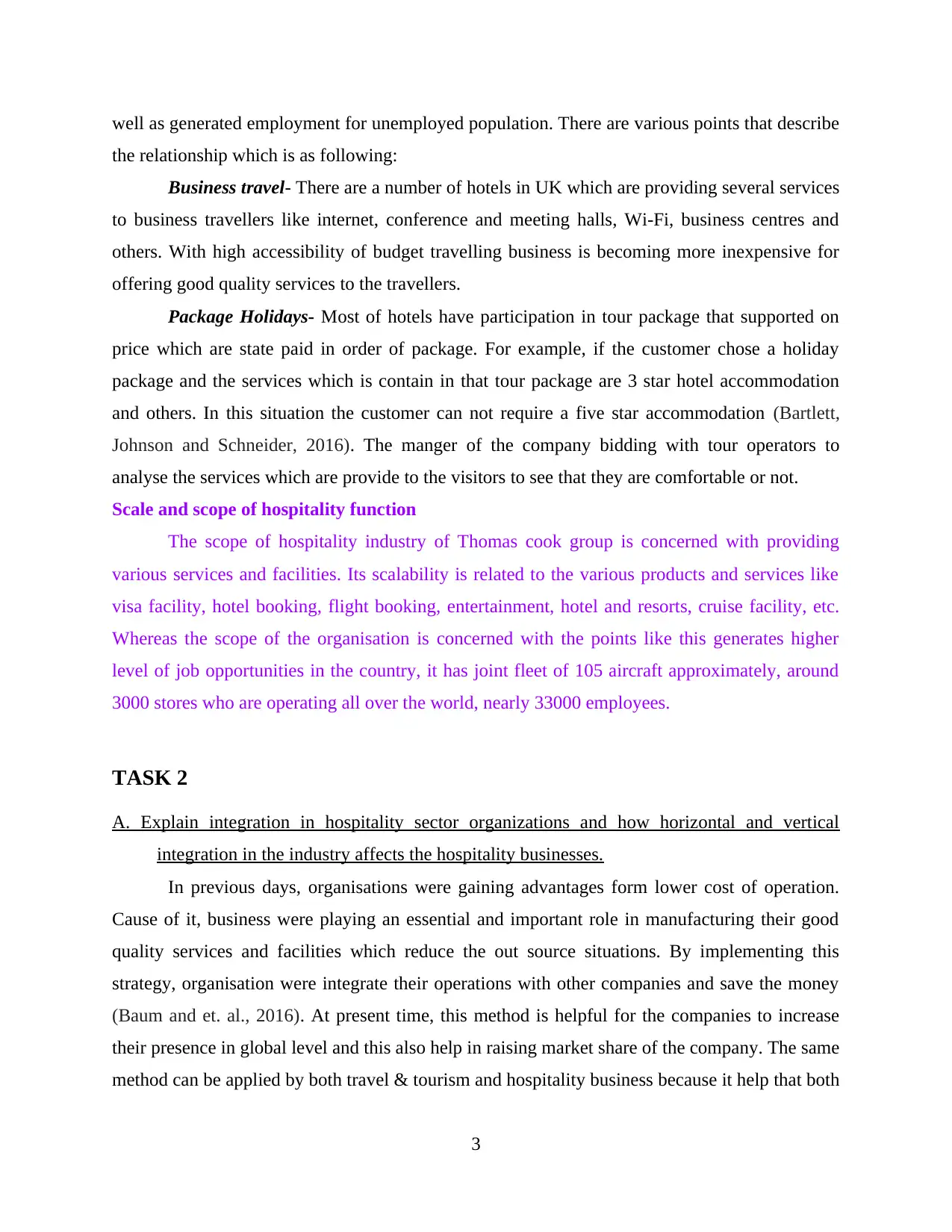
well as generated employment for unemployed population. There are various points that describe
the relationship which is as following:
Business travel- There are a number of hotels in UK which are providing several services
to business travellers like internet, conference and meeting halls, Wi-Fi, business centres and
others. With high accessibility of budget travelling business is becoming more inexpensive for
offering good quality services to the travellers.
Package Holidays- Most of hotels have participation in tour package that supported on
price which are state paid in order of package. For example, if the customer chose a holiday
package and the services which is contain in that tour package are 3 star hotel accommodation
and others. In this situation the customer can not require a five star accommodation (Bartlett,
Johnson and Schneider, 2016). The manger of the company bidding with tour operators to
analyse the services which are provide to the visitors to see that they are comfortable or not.
Scale and scope of hospitality function
The scope of hospitality industry of Thomas cook group is concerned with providing
various services and facilities. Its scalability is related to the various products and services like
visa facility, hotel booking, flight booking, entertainment, hotel and resorts, cruise facility, etc.
Whereas the scope of the organisation is concerned with the points like this generates higher
level of job opportunities in the country, it has joint fleet of 105 aircraft approximately, around
3000 stores who are operating all over the world, nearly 33000 employees.
TASK 2
A. Explain integration in hospitality sector organizations and how horizontal and vertical
integration in the industry affects the hospitality businesses.
In previous days, organisations were gaining advantages form lower cost of operation.
Cause of it, business were playing an essential and important role in manufacturing their good
quality services and facilities which reduce the out source situations. By implementing this
strategy, organisation were integrate their operations with other companies and save the money
(Baum and et. al., 2016). At present time, this method is helpful for the companies to increase
their presence in global level and this also help in raising market share of the company. The same
method can be applied by both travel & tourism and hospitality business because it help that both
3
the relationship which is as following:
Business travel- There are a number of hotels in UK which are providing several services
to business travellers like internet, conference and meeting halls, Wi-Fi, business centres and
others. With high accessibility of budget travelling business is becoming more inexpensive for
offering good quality services to the travellers.
Package Holidays- Most of hotels have participation in tour package that supported on
price which are state paid in order of package. For example, if the customer chose a holiday
package and the services which is contain in that tour package are 3 star hotel accommodation
and others. In this situation the customer can not require a five star accommodation (Bartlett,
Johnson and Schneider, 2016). The manger of the company bidding with tour operators to
analyse the services which are provide to the visitors to see that they are comfortable or not.
Scale and scope of hospitality function
The scope of hospitality industry of Thomas cook group is concerned with providing
various services and facilities. Its scalability is related to the various products and services like
visa facility, hotel booking, flight booking, entertainment, hotel and resorts, cruise facility, etc.
Whereas the scope of the organisation is concerned with the points like this generates higher
level of job opportunities in the country, it has joint fleet of 105 aircraft approximately, around
3000 stores who are operating all over the world, nearly 33000 employees.
TASK 2
A. Explain integration in hospitality sector organizations and how horizontal and vertical
integration in the industry affects the hospitality businesses.
In previous days, organisations were gaining advantages form lower cost of operation.
Cause of it, business were playing an essential and important role in manufacturing their good
quality services and facilities which reduce the out source situations. By implementing this
strategy, organisation were integrate their operations with other companies and save the money
(Baum and et. al., 2016). At present time, this method is helpful for the companies to increase
their presence in global level and this also help in raising market share of the company. The same
method can be applied by both travel & tourism and hospitality business because it help that both
3
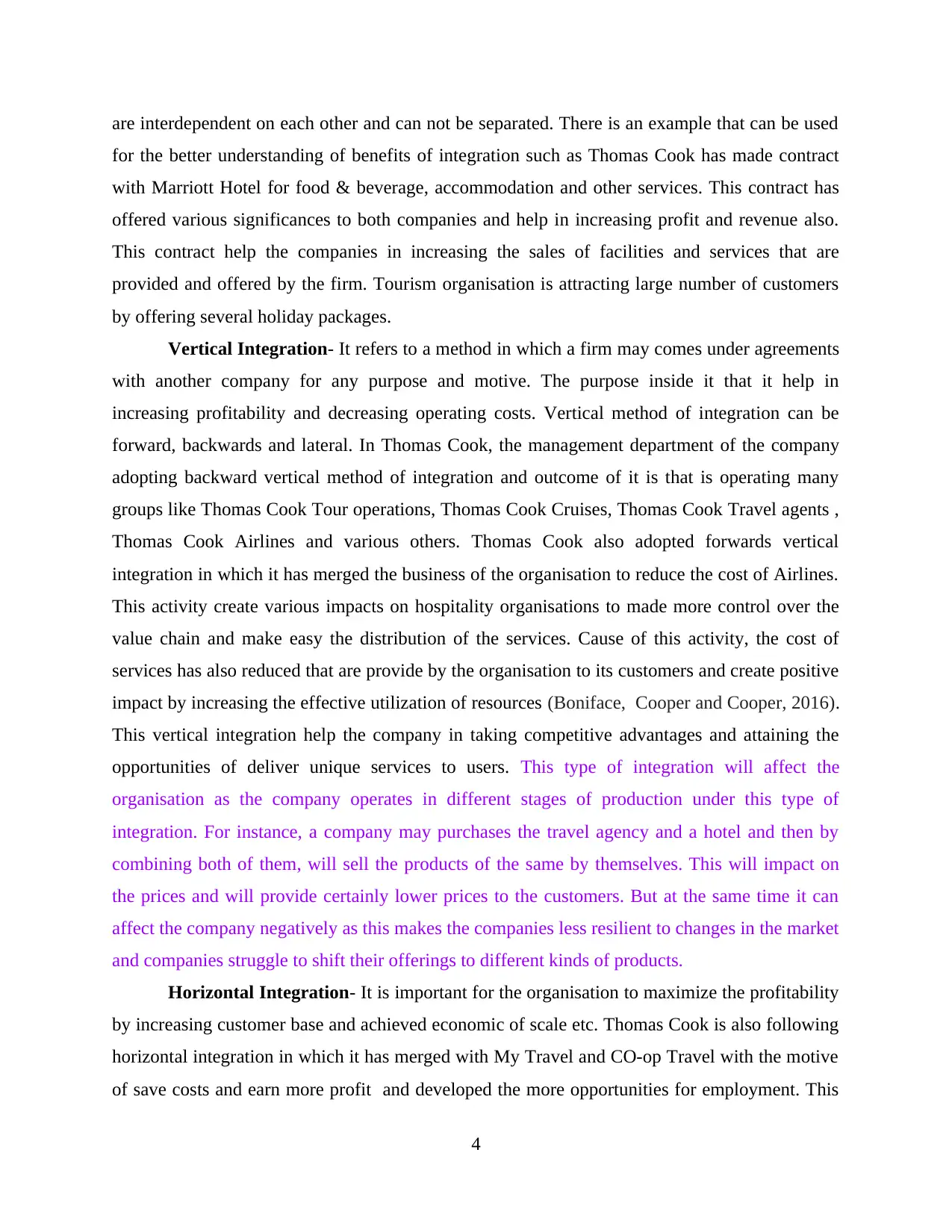
are interdependent on each other and can not be separated. There is an example that can be used
for the better understanding of benefits of integration such as Thomas Cook has made contract
with Marriott Hotel for food & beverage, accommodation and other services. This contract has
offered various significances to both companies and help in increasing profit and revenue also.
This contract help the companies in increasing the sales of facilities and services that are
provided and offered by the firm. Tourism organisation is attracting large number of customers
by offering several holiday packages.
Vertical Integration- It refers to a method in which a firm may comes under agreements
with another company for any purpose and motive. The purpose inside it that it help in
increasing profitability and decreasing operating costs. Vertical method of integration can be
forward, backwards and lateral. In Thomas Cook, the management department of the company
adopting backward vertical method of integration and outcome of it is that is operating many
groups like Thomas Cook Tour operations, Thomas Cook Cruises, Thomas Cook Travel agents ,
Thomas Cook Airlines and various others. Thomas Cook also adopted forwards vertical
integration in which it has merged the business of the organisation to reduce the cost of Airlines.
This activity create various impacts on hospitality organisations to made more control over the
value chain and make easy the distribution of the services. Cause of this activity, the cost of
services has also reduced that are provide by the organisation to its customers and create positive
impact by increasing the effective utilization of resources (Boniface, Cooper and Cooper, 2016).
This vertical integration help the company in taking competitive advantages and attaining the
opportunities of deliver unique services to users. This type of integration will affect the
organisation as the company operates in different stages of production under this type of
integration. For instance, a company may purchases the travel agency and a hotel and then by
combining both of them, will sell the products of the same by themselves. This will impact on
the prices and will provide certainly lower prices to the customers. But at the same time it can
affect the company negatively as this makes the companies less resilient to changes in the market
and companies struggle to shift their offerings to different kinds of products.
Horizontal Integration- It is important for the organisation to maximize the profitability
by increasing customer base and achieved economic of scale etc. Thomas Cook is also following
horizontal integration in which it has merged with My Travel and CO-op Travel with the motive
of save costs and earn more profit and developed the more opportunities for employment. This
4
for the better understanding of benefits of integration such as Thomas Cook has made contract
with Marriott Hotel for food & beverage, accommodation and other services. This contract has
offered various significances to both companies and help in increasing profit and revenue also.
This contract help the companies in increasing the sales of facilities and services that are
provided and offered by the firm. Tourism organisation is attracting large number of customers
by offering several holiday packages.
Vertical Integration- It refers to a method in which a firm may comes under agreements
with another company for any purpose and motive. The purpose inside it that it help in
increasing profitability and decreasing operating costs. Vertical method of integration can be
forward, backwards and lateral. In Thomas Cook, the management department of the company
adopting backward vertical method of integration and outcome of it is that is operating many
groups like Thomas Cook Tour operations, Thomas Cook Cruises, Thomas Cook Travel agents ,
Thomas Cook Airlines and various others. Thomas Cook also adopted forwards vertical
integration in which it has merged the business of the organisation to reduce the cost of Airlines.
This activity create various impacts on hospitality organisations to made more control over the
value chain and make easy the distribution of the services. Cause of this activity, the cost of
services has also reduced that are provide by the organisation to its customers and create positive
impact by increasing the effective utilization of resources (Boniface, Cooper and Cooper, 2016).
This vertical integration help the company in taking competitive advantages and attaining the
opportunities of deliver unique services to users. This type of integration will affect the
organisation as the company operates in different stages of production under this type of
integration. For instance, a company may purchases the travel agency and a hotel and then by
combining both of them, will sell the products of the same by themselves. This will impact on
the prices and will provide certainly lower prices to the customers. But at the same time it can
affect the company negatively as this makes the companies less resilient to changes in the market
and companies struggle to shift their offerings to different kinds of products.
Horizontal Integration- It is important for the organisation to maximize the profitability
by increasing customer base and achieved economic of scale etc. Thomas Cook is also following
horizontal integration in which it has merged with My Travel and CO-op Travel with the motive
of save costs and earn more profit and developed the more opportunities for employment. This
4
⊘ This is a preview!⊘
Do you want full access?
Subscribe today to unlock all pages.

Trusted by 1+ million students worldwide
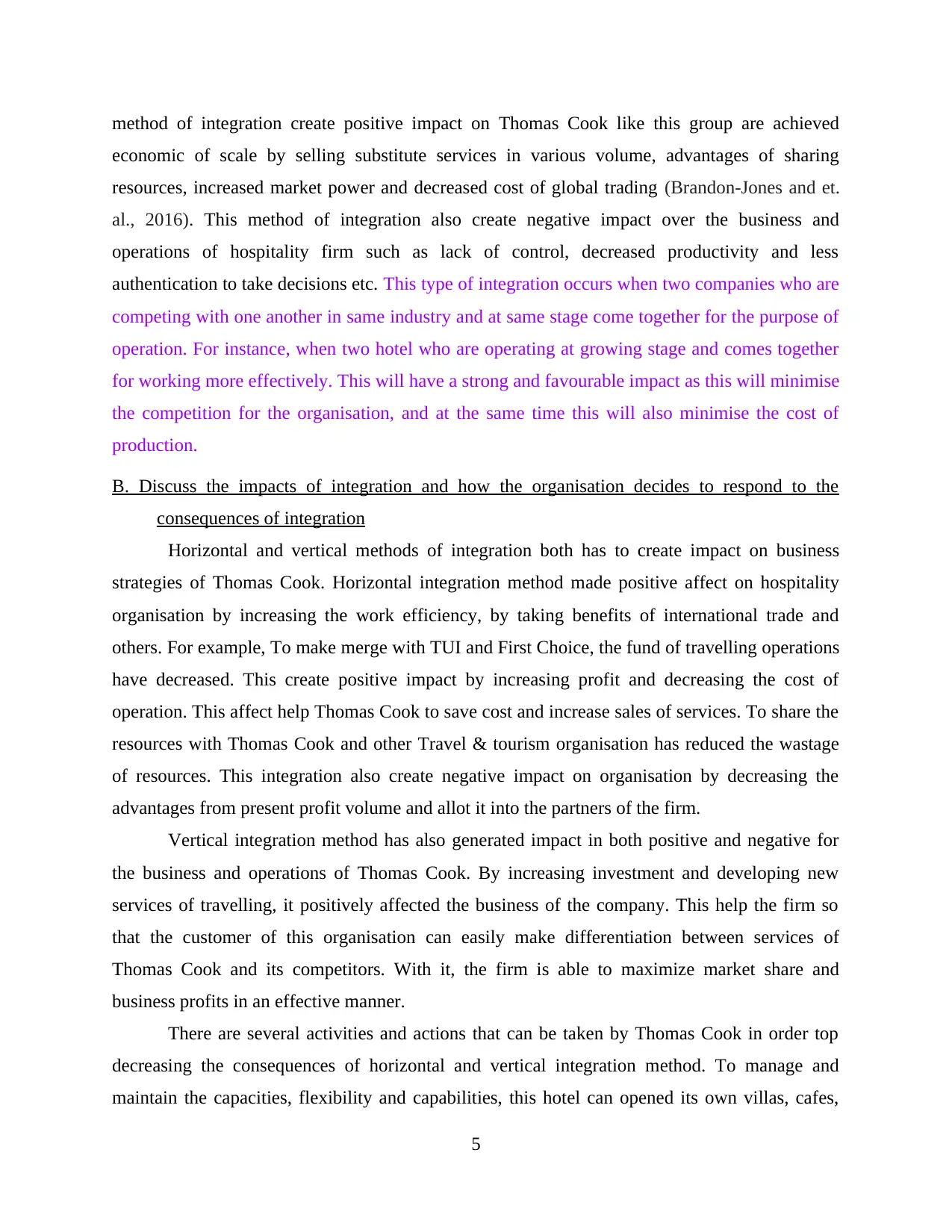
method of integration create positive impact on Thomas Cook like this group are achieved
economic of scale by selling substitute services in various volume, advantages of sharing
resources, increased market power and decreased cost of global trading (Brandon-Jones and et.
al., 2016). This method of integration also create negative impact over the business and
operations of hospitality firm such as lack of control, decreased productivity and less
authentication to take decisions etc. This type of integration occurs when two companies who are
competing with one another in same industry and at same stage come together for the purpose of
operation. For instance, when two hotel who are operating at growing stage and comes together
for working more effectively. This will have a strong and favourable impact as this will minimise
the competition for the organisation, and at the same time this will also minimise the cost of
production.
B. Discuss the impacts of integration and how the organisation decides to respond to the
consequences of integration
Horizontal and vertical methods of integration both has to create impact on business
strategies of Thomas Cook. Horizontal integration method made positive affect on hospitality
organisation by increasing the work efficiency, by taking benefits of international trade and
others. For example, To make merge with TUI and First Choice, the fund of travelling operations
have decreased. This create positive impact by increasing profit and decreasing the cost of
operation. This affect help Thomas Cook to save cost and increase sales of services. To share the
resources with Thomas Cook and other Travel & tourism organisation has reduced the wastage
of resources. This integration also create negative impact on organisation by decreasing the
advantages from present profit volume and allot it into the partners of the firm.
Vertical integration method has also generated impact in both positive and negative for
the business and operations of Thomas Cook. By increasing investment and developing new
services of travelling, it positively affected the business of the company. This help the firm so
that the customer of this organisation can easily make differentiation between services of
Thomas Cook and its competitors. With it, the firm is able to maximize market share and
business profits in an effective manner.
There are several activities and actions that can be taken by Thomas Cook in order top
decreasing the consequences of horizontal and vertical integration method. To manage and
maintain the capacities, flexibility and capabilities, this hotel can opened its own villas, cafes,
5
economic of scale by selling substitute services in various volume, advantages of sharing
resources, increased market power and decreased cost of global trading (Brandon-Jones and et.
al., 2016). This method of integration also create negative impact over the business and
operations of hospitality firm such as lack of control, decreased productivity and less
authentication to take decisions etc. This type of integration occurs when two companies who are
competing with one another in same industry and at same stage come together for the purpose of
operation. For instance, when two hotel who are operating at growing stage and comes together
for working more effectively. This will have a strong and favourable impact as this will minimise
the competition for the organisation, and at the same time this will also minimise the cost of
production.
B. Discuss the impacts of integration and how the organisation decides to respond to the
consequences of integration
Horizontal and vertical methods of integration both has to create impact on business
strategies of Thomas Cook. Horizontal integration method made positive affect on hospitality
organisation by increasing the work efficiency, by taking benefits of international trade and
others. For example, To make merge with TUI and First Choice, the fund of travelling operations
have decreased. This create positive impact by increasing profit and decreasing the cost of
operation. This affect help Thomas Cook to save cost and increase sales of services. To share the
resources with Thomas Cook and other Travel & tourism organisation has reduced the wastage
of resources. This integration also create negative impact on organisation by decreasing the
advantages from present profit volume and allot it into the partners of the firm.
Vertical integration method has also generated impact in both positive and negative for
the business and operations of Thomas Cook. By increasing investment and developing new
services of travelling, it positively affected the business of the company. This help the firm so
that the customer of this organisation can easily make differentiation between services of
Thomas Cook and its competitors. With it, the firm is able to maximize market share and
business profits in an effective manner.
There are several activities and actions that can be taken by Thomas Cook in order top
decreasing the consequences of horizontal and vertical integration method. To manage and
maintain the capacities, flexibility and capabilities, this hotel can opened its own villas, cafes,
5
Paraphrase This Document
Need a fresh take? Get an instant paraphrase of this document with our AI Paraphraser
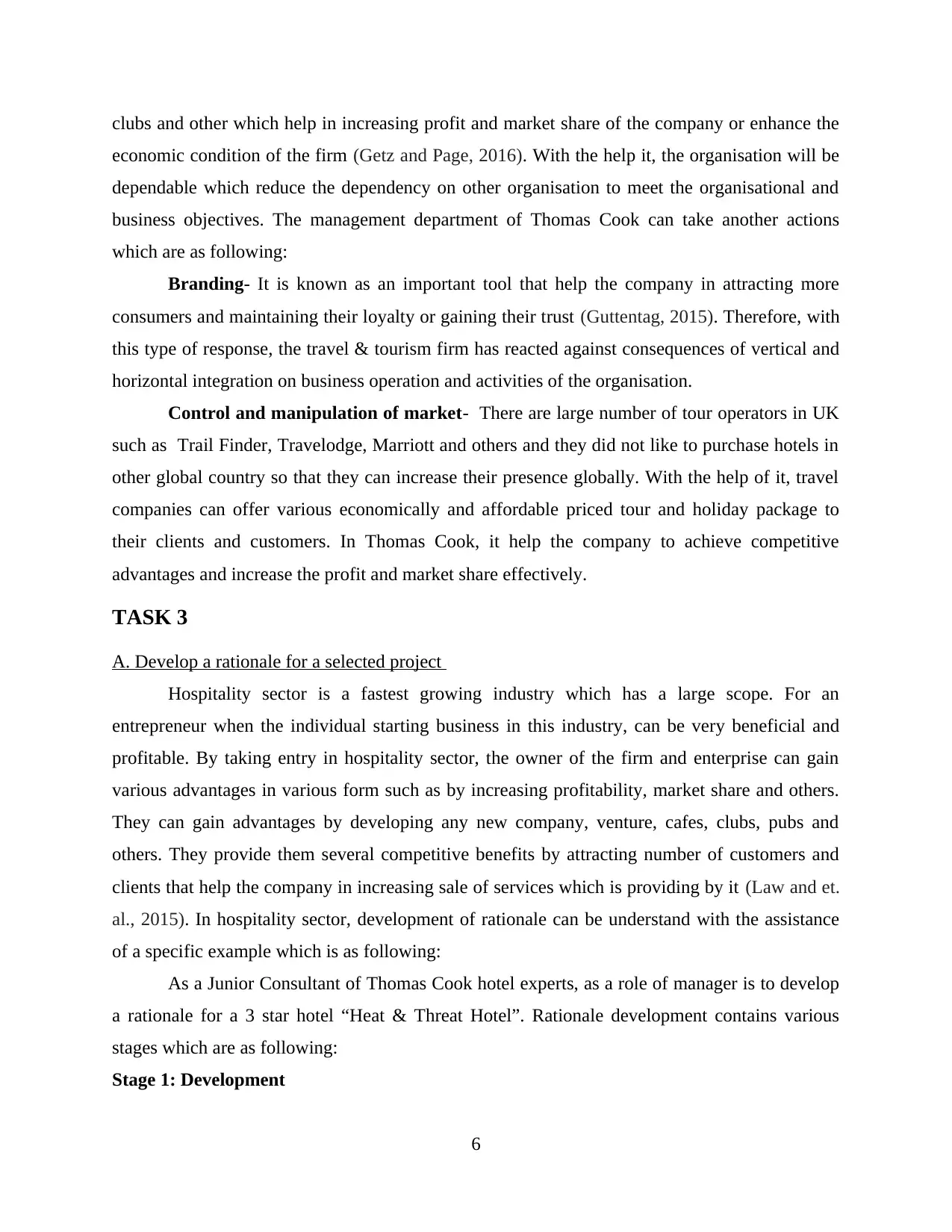
clubs and other which help in increasing profit and market share of the company or enhance the
economic condition of the firm (Getz and Page, 2016). With the help it, the organisation will be
dependable which reduce the dependency on other organisation to meet the organisational and
business objectives. The management department of Thomas Cook can take another actions
which are as following:
Branding- It is known as an important tool that help the company in attracting more
consumers and maintaining their loyalty or gaining their trust (Guttentag, 2015). Therefore, with
this type of response, the travel & tourism firm has reacted against consequences of vertical and
horizontal integration on business operation and activities of the organisation.
Control and manipulation of market- There are large number of tour operators in UK
such as Trail Finder, Travelodge, Marriott and others and they did not like to purchase hotels in
other global country so that they can increase their presence globally. With the help of it, travel
companies can offer various economically and affordable priced tour and holiday package to
their clients and customers. In Thomas Cook, it help the company to achieve competitive
advantages and increase the profit and market share effectively.
TASK 3
A. Develop a rationale for a selected project
Hospitality sector is a fastest growing industry which has a large scope. For an
entrepreneur when the individual starting business in this industry, can be very beneficial and
profitable. By taking entry in hospitality sector, the owner of the firm and enterprise can gain
various advantages in various form such as by increasing profitability, market share and others.
They can gain advantages by developing any new company, venture, cafes, clubs, pubs and
others. They provide them several competitive benefits by attracting number of customers and
clients that help the company in increasing sale of services which is providing by it (Law and et.
al., 2015). In hospitality sector, development of rationale can be understand with the assistance
of a specific example which is as following:
As a Junior Consultant of Thomas Cook hotel experts, as a role of manager is to develop
a rationale for a 3 star hotel “Heat & Threat Hotel”. Rationale development contains various
stages which are as following:
Stage 1: Development
6
economic condition of the firm (Getz and Page, 2016). With the help it, the organisation will be
dependable which reduce the dependency on other organisation to meet the organisational and
business objectives. The management department of Thomas Cook can take another actions
which are as following:
Branding- It is known as an important tool that help the company in attracting more
consumers and maintaining their loyalty or gaining their trust (Guttentag, 2015). Therefore, with
this type of response, the travel & tourism firm has reacted against consequences of vertical and
horizontal integration on business operation and activities of the organisation.
Control and manipulation of market- There are large number of tour operators in UK
such as Trail Finder, Travelodge, Marriott and others and they did not like to purchase hotels in
other global country so that they can increase their presence globally. With the help of it, travel
companies can offer various economically and affordable priced tour and holiday package to
their clients and customers. In Thomas Cook, it help the company to achieve competitive
advantages and increase the profit and market share effectively.
TASK 3
A. Develop a rationale for a selected project
Hospitality sector is a fastest growing industry which has a large scope. For an
entrepreneur when the individual starting business in this industry, can be very beneficial and
profitable. By taking entry in hospitality sector, the owner of the firm and enterprise can gain
various advantages in various form such as by increasing profitability, market share and others.
They can gain advantages by developing any new company, venture, cafes, clubs, pubs and
others. They provide them several competitive benefits by attracting number of customers and
clients that help the company in increasing sale of services which is providing by it (Law and et.
al., 2015). In hospitality sector, development of rationale can be understand with the assistance
of a specific example which is as following:
As a Junior Consultant of Thomas Cook hotel experts, as a role of manager is to develop
a rationale for a 3 star hotel “Heat & Threat Hotel”. Rationale development contains various
stages which are as following:
Stage 1: Development
6
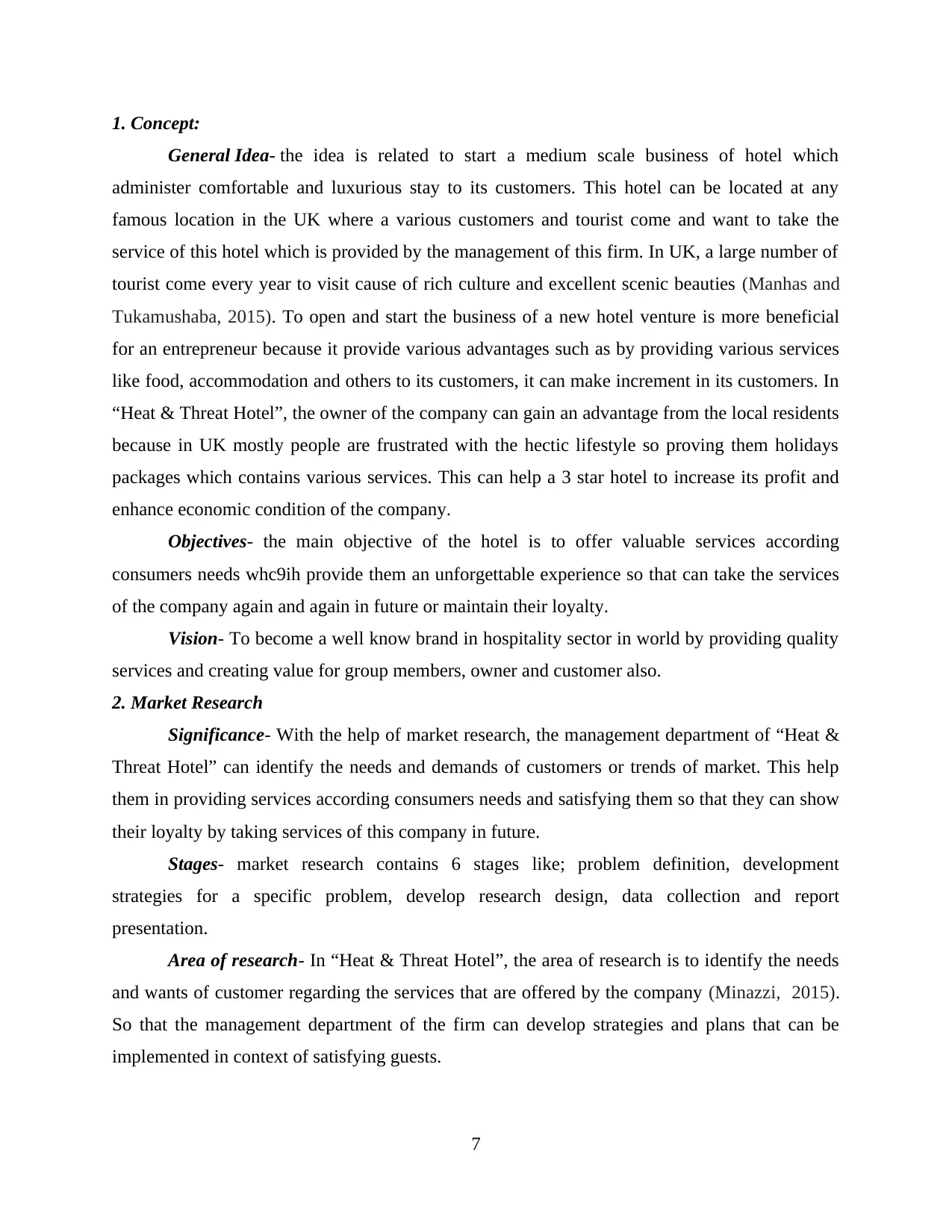
1. Concept:
General Idea- the idea is related to start a medium scale business of hotel which
administer comfortable and luxurious stay to its customers. This hotel can be located at any
famous location in the UK where a various customers and tourist come and want to take the
service of this hotel which is provided by the management of this firm. In UK, a large number of
tourist come every year to visit cause of rich culture and excellent scenic beauties (Manhas and
Tukamushaba, 2015). To open and start the business of a new hotel venture is more beneficial
for an entrepreneur because it provide various advantages such as by providing various services
like food, accommodation and others to its customers, it can make increment in its customers. In
“Heat & Threat Hotel”, the owner of the company can gain an advantage from the local residents
because in UK mostly people are frustrated with the hectic lifestyle so proving them holidays
packages which contains various services. This can help a 3 star hotel to increase its profit and
enhance economic condition of the company.
Objectives- the main objective of the hotel is to offer valuable services according
consumers needs whc9ih provide them an unforgettable experience so that can take the services
of the company again and again in future or maintain their loyalty.
Vision- To become a well know brand in hospitality sector in world by providing quality
services and creating value for group members, owner and customer also.
2. Market Research
Significance- With the help of market research, the management department of “Heat &
Threat Hotel” can identify the needs and demands of customers or trends of market. This help
them in providing services according consumers needs and satisfying them so that they can show
their loyalty by taking services of this company in future.
Stages- market research contains 6 stages like; problem definition, development
strategies for a specific problem, develop research design, data collection and report
presentation.
Area of research- In “Heat & Threat Hotel”, the area of research is to identify the needs
and wants of customer regarding the services that are offered by the company (Minazzi, 2015).
So that the management department of the firm can develop strategies and plans that can be
implemented in context of satisfying guests.
7
General Idea- the idea is related to start a medium scale business of hotel which
administer comfortable and luxurious stay to its customers. This hotel can be located at any
famous location in the UK where a various customers and tourist come and want to take the
service of this hotel which is provided by the management of this firm. In UK, a large number of
tourist come every year to visit cause of rich culture and excellent scenic beauties (Manhas and
Tukamushaba, 2015). To open and start the business of a new hotel venture is more beneficial
for an entrepreneur because it provide various advantages such as by providing various services
like food, accommodation and others to its customers, it can make increment in its customers. In
“Heat & Threat Hotel”, the owner of the company can gain an advantage from the local residents
because in UK mostly people are frustrated with the hectic lifestyle so proving them holidays
packages which contains various services. This can help a 3 star hotel to increase its profit and
enhance economic condition of the company.
Objectives- the main objective of the hotel is to offer valuable services according
consumers needs whc9ih provide them an unforgettable experience so that can take the services
of the company again and again in future or maintain their loyalty.
Vision- To become a well know brand in hospitality sector in world by providing quality
services and creating value for group members, owner and customer also.
2. Market Research
Significance- With the help of market research, the management department of “Heat &
Threat Hotel” can identify the needs and demands of customers or trends of market. This help
them in providing services according consumers needs and satisfying them so that they can show
their loyalty by taking services of this company in future.
Stages- market research contains 6 stages like; problem definition, development
strategies for a specific problem, develop research design, data collection and report
presentation.
Area of research- In “Heat & Threat Hotel”, the area of research is to identify the needs
and wants of customer regarding the services that are offered by the company (Minazzi, 2015).
So that the management department of the firm can develop strategies and plans that can be
implemented in context of satisfying guests.
7
⊘ This is a preview!⊘
Do you want full access?
Subscribe today to unlock all pages.

Trusted by 1+ million students worldwide
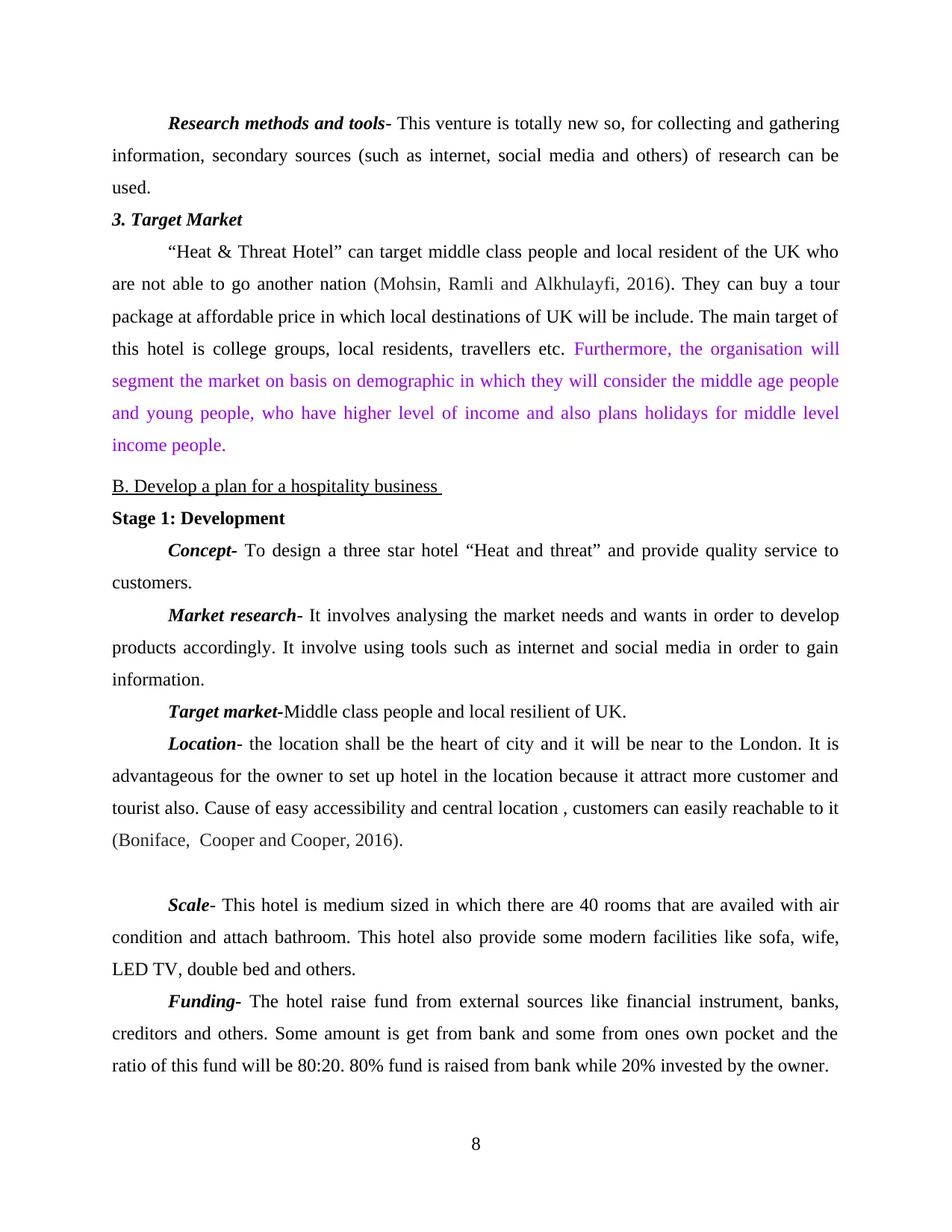
Research methods and tools- This venture is totally new so, for collecting and gathering
information, secondary sources (such as internet, social media and others) of research can be
used.
3. Target Market
“Heat & Threat Hotel” can target middle class people and local resident of the UK who
are not able to go another nation (Mohsin, Ramli and Alkhulayfi, 2016). They can buy a tour
package at affordable price in which local destinations of UK will be include. The main target of
this hotel is college groups, local residents, travellers etc. Furthermore, the organisation will
segment the market on basis on demographic in which they will consider the middle age people
and young people, who have higher level of income and also plans holidays for middle level
income people.
B. Develop a plan for a hospitality business
Stage 1: Development
Concept- To design a three star hotel “Heat and threat” and provide quality service to
customers.
Market research- It involves analysing the market needs and wants in order to develop
products accordingly. It involve using tools such as internet and social media in order to gain
information.
Target market-Middle class people and local resilient of UK.
Location- the location shall be the heart of city and it will be near to the London. It is
advantageous for the owner to set up hotel in the location because it attract more customer and
tourist also. Cause of easy accessibility and central location , customers can easily reachable to it
(Boniface, Cooper and Cooper, 2016).
Scale- This hotel is medium sized in which there are 40 rooms that are availed with air
condition and attach bathroom. This hotel also provide some modern facilities like sofa, wife,
LED TV, double bed and others.
Funding- The hotel raise fund from external sources like financial instrument, banks,
creditors and others. Some amount is get from bank and some from ones own pocket and the
ratio of this fund will be 80:20. 80% fund is raised from bank while 20% invested by the owner.
8
information, secondary sources (such as internet, social media and others) of research can be
used.
3. Target Market
“Heat & Threat Hotel” can target middle class people and local resident of the UK who
are not able to go another nation (Mohsin, Ramli and Alkhulayfi, 2016). They can buy a tour
package at affordable price in which local destinations of UK will be include. The main target of
this hotel is college groups, local residents, travellers etc. Furthermore, the organisation will
segment the market on basis on demographic in which they will consider the middle age people
and young people, who have higher level of income and also plans holidays for middle level
income people.
B. Develop a plan for a hospitality business
Stage 1: Development
Concept- To design a three star hotel “Heat and threat” and provide quality service to
customers.
Market research- It involves analysing the market needs and wants in order to develop
products accordingly. It involve using tools such as internet and social media in order to gain
information.
Target market-Middle class people and local resilient of UK.
Location- the location shall be the heart of city and it will be near to the London. It is
advantageous for the owner to set up hotel in the location because it attract more customer and
tourist also. Cause of easy accessibility and central location , customers can easily reachable to it
(Boniface, Cooper and Cooper, 2016).
Scale- This hotel is medium sized in which there are 40 rooms that are availed with air
condition and attach bathroom. This hotel also provide some modern facilities like sofa, wife,
LED TV, double bed and others.
Funding- The hotel raise fund from external sources like financial instrument, banks,
creditors and others. Some amount is get from bank and some from ones own pocket and the
ratio of this fund will be 80:20. 80% fund is raised from bank while 20% invested by the owner.
8
Paraphrase This Document
Need a fresh take? Get an instant paraphrase of this document with our AI Paraphraser
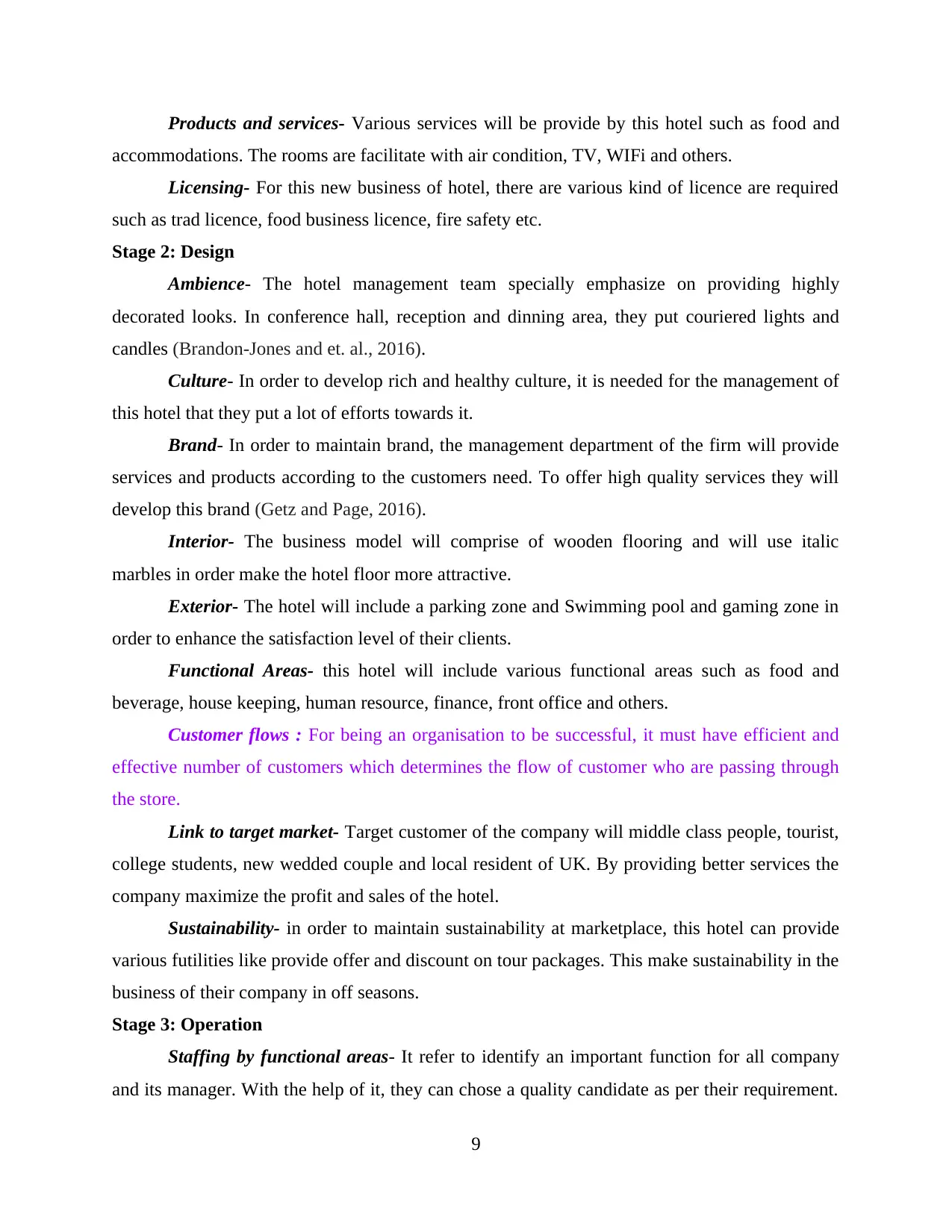
Products and services- Various services will be provide by this hotel such as food and
accommodations. The rooms are facilitate with air condition, TV, WIFi and others.
Licensing- For this new business of hotel, there are various kind of licence are required
such as trad licence, food business licence, fire safety etc.
Stage 2: Design
Ambience- The hotel management team specially emphasize on providing highly
decorated looks. In conference hall, reception and dinning area, they put couriered lights and
candles (Brandon-Jones and et. al., 2016).
Culture- In order to develop rich and healthy culture, it is needed for the management of
this hotel that they put a lot of efforts towards it.
Brand- In order to maintain brand, the management department of the firm will provide
services and products according to the customers need. To offer high quality services they will
develop this brand (Getz and Page, 2016).
Interior- The business model will comprise of wooden flooring and will use italic
marbles in order make the hotel floor more attractive.
Exterior- The hotel will include a parking zone and Swimming pool and gaming zone in
order to enhance the satisfaction level of their clients.
Functional Areas- this hotel will include various functional areas such as food and
beverage, house keeping, human resource, finance, front office and others.
Customer flows : For being an organisation to be successful, it must have efficient and
effective number of customers which determines the flow of customer who are passing through
the store.
Link to target market- Target customer of the company will middle class people, tourist,
college students, new wedded couple and local resident of UK. By providing better services the
company maximize the profit and sales of the hotel.
Sustainability- in order to maintain sustainability at marketplace, this hotel can provide
various futilities like provide offer and discount on tour packages. This make sustainability in the
business of their company in off seasons.
Stage 3: Operation
Staffing by functional areas- It refer to identify an important function for all company
and its manager. With the help of it, they can chose a quality candidate as per their requirement.
9
accommodations. The rooms are facilitate with air condition, TV, WIFi and others.
Licensing- For this new business of hotel, there are various kind of licence are required
such as trad licence, food business licence, fire safety etc.
Stage 2: Design
Ambience- The hotel management team specially emphasize on providing highly
decorated looks. In conference hall, reception and dinning area, they put couriered lights and
candles (Brandon-Jones and et. al., 2016).
Culture- In order to develop rich and healthy culture, it is needed for the management of
this hotel that they put a lot of efforts towards it.
Brand- In order to maintain brand, the management department of the firm will provide
services and products according to the customers need. To offer high quality services they will
develop this brand (Getz and Page, 2016).
Interior- The business model will comprise of wooden flooring and will use italic
marbles in order make the hotel floor more attractive.
Exterior- The hotel will include a parking zone and Swimming pool and gaming zone in
order to enhance the satisfaction level of their clients.
Functional Areas- this hotel will include various functional areas such as food and
beverage, house keeping, human resource, finance, front office and others.
Customer flows : For being an organisation to be successful, it must have efficient and
effective number of customers which determines the flow of customer who are passing through
the store.
Link to target market- Target customer of the company will middle class people, tourist,
college students, new wedded couple and local resident of UK. By providing better services the
company maximize the profit and sales of the hotel.
Sustainability- in order to maintain sustainability at marketplace, this hotel can provide
various futilities like provide offer and discount on tour packages. This make sustainability in the
business of their company in off seasons.
Stage 3: Operation
Staffing by functional areas- It refer to identify an important function for all company
and its manager. With the help of it, they can chose a quality candidate as per their requirement.
9
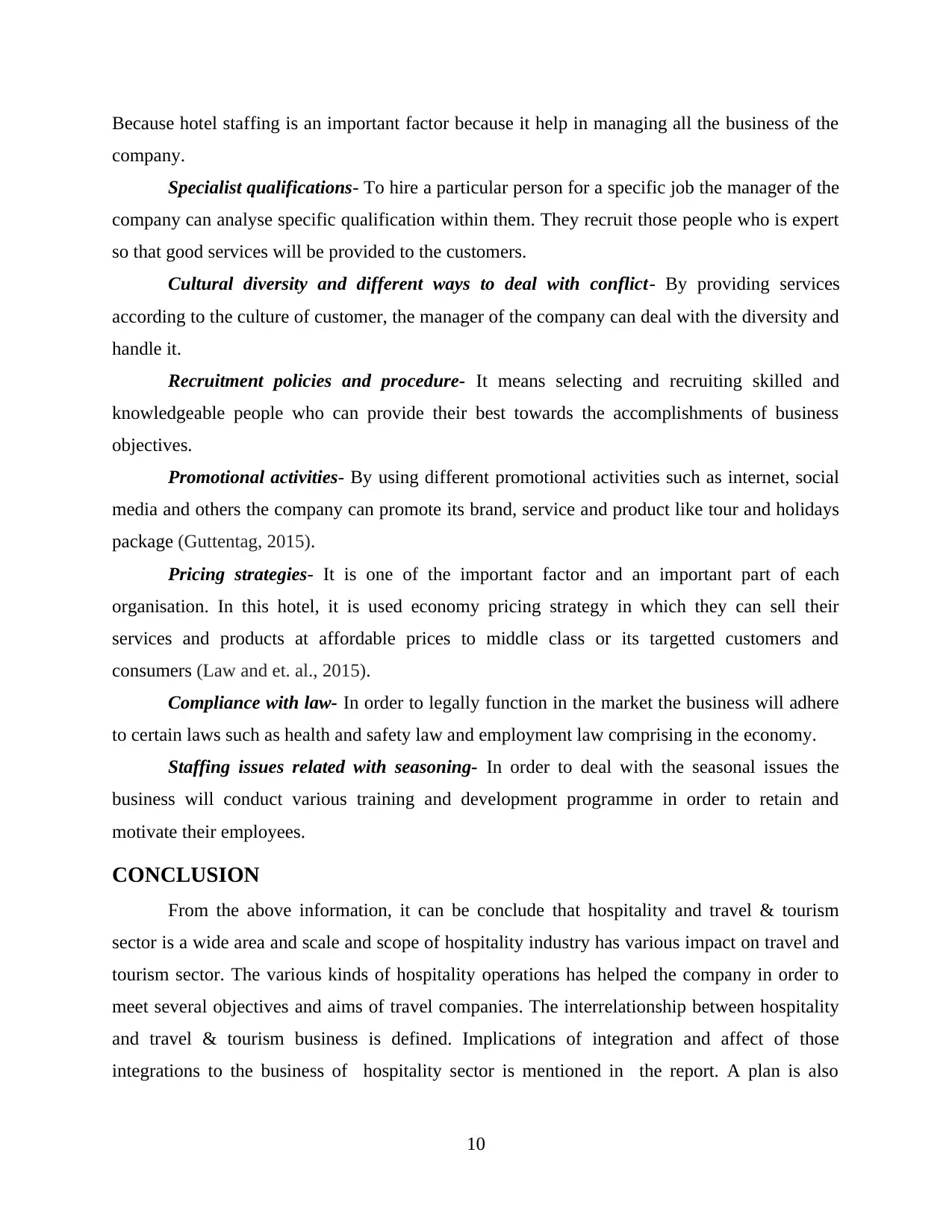
Because hotel staffing is an important factor because it help in managing all the business of the
company.
Specialist qualifications- To hire a particular person for a specific job the manager of the
company can analyse specific qualification within them. They recruit those people who is expert
so that good services will be provided to the customers.
Cultural diversity and different ways to deal with conflict- By providing services
according to the culture of customer, the manager of the company can deal with the diversity and
handle it.
Recruitment policies and procedure- It means selecting and recruiting skilled and
knowledgeable people who can provide their best towards the accomplishments of business
objectives.
Promotional activities- By using different promotional activities such as internet, social
media and others the company can promote its brand, service and product like tour and holidays
package (Guttentag, 2015).
Pricing strategies- It is one of the important factor and an important part of each
organisation. In this hotel, it is used economy pricing strategy in which they can sell their
services and products at affordable prices to middle class or its targetted customers and
consumers (Law and et. al., 2015).
Compliance with law- In order to legally function in the market the business will adhere
to certain laws such as health and safety law and employment law comprising in the economy.
Staffing issues related with seasoning- In order to deal with the seasonal issues the
business will conduct various training and development programme in order to retain and
motivate their employees.
CONCLUSION
From the above information, it can be conclude that hospitality and travel & tourism
sector is a wide area and scale and scope of hospitality industry has various impact on travel and
tourism sector. The various kinds of hospitality operations has helped the company in order to
meet several objectives and aims of travel companies. The interrelationship between hospitality
and travel & tourism business is defined. Implications of integration and affect of those
integrations to the business of hospitality sector is mentioned in the report. A plan is also
10
company.
Specialist qualifications- To hire a particular person for a specific job the manager of the
company can analyse specific qualification within them. They recruit those people who is expert
so that good services will be provided to the customers.
Cultural diversity and different ways to deal with conflict- By providing services
according to the culture of customer, the manager of the company can deal with the diversity and
handle it.
Recruitment policies and procedure- It means selecting and recruiting skilled and
knowledgeable people who can provide their best towards the accomplishments of business
objectives.
Promotional activities- By using different promotional activities such as internet, social
media and others the company can promote its brand, service and product like tour and holidays
package (Guttentag, 2015).
Pricing strategies- It is one of the important factor and an important part of each
organisation. In this hotel, it is used economy pricing strategy in which they can sell their
services and products at affordable prices to middle class or its targetted customers and
consumers (Law and et. al., 2015).
Compliance with law- In order to legally function in the market the business will adhere
to certain laws such as health and safety law and employment law comprising in the economy.
Staffing issues related with seasoning- In order to deal with the seasonal issues the
business will conduct various training and development programme in order to retain and
motivate their employees.
CONCLUSION
From the above information, it can be conclude that hospitality and travel & tourism
sector is a wide area and scale and scope of hospitality industry has various impact on travel and
tourism sector. The various kinds of hospitality operations has helped the company in order to
meet several objectives and aims of travel companies. The interrelationship between hospitality
and travel & tourism business is defined. Implications of integration and affect of those
integrations to the business of hospitality sector is mentioned in the report. A plan is also
10
⊘ This is a preview!⊘
Do you want full access?
Subscribe today to unlock all pages.

Trusted by 1+ million students worldwide
1 out of 14
Related Documents
Your All-in-One AI-Powered Toolkit for Academic Success.
+13062052269
info@desklib.com
Available 24*7 on WhatsApp / Email
![[object Object]](/_next/static/media/star-bottom.7253800d.svg)
Unlock your academic potential
Copyright © 2020–2026 A2Z Services. All Rights Reserved. Developed and managed by ZUCOL.





